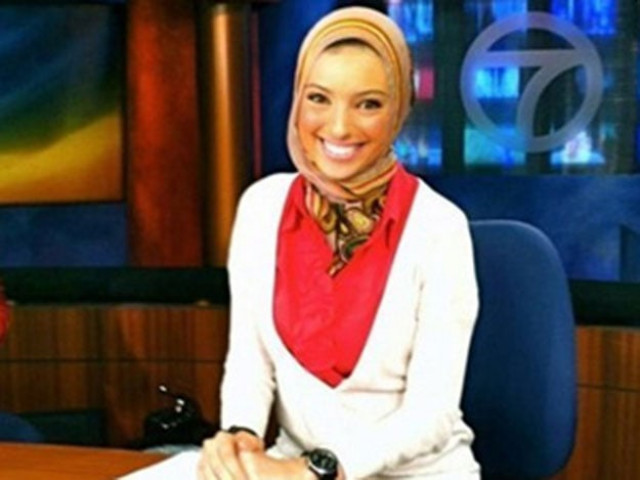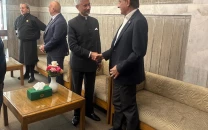American woman hopes to become first-ever hijabi anchor on commercial television
I grew up knowing that I wanted to be a reporter, Tagouri says

Noor Tagouri said she often felt "ashamed" to be a Muslim outsider in her community and though she struggled with her identity during childhood, the 21-year-old now fully embraces her religion and culture.
"My name, Noor, means 'light.' My middle name is Alhuda, so Noor Alhuda means 'the guiding light,'" she said in an interview. "My name itself inspires me to be that guiding light," she added.
In 2012, Tagouri launched her social media campaign #LetNoorShine -- or, "let light shine" -- to inspire both herself and others to follow their dreams.
"I started #LetNoorShine when I decided I was going to be very vocal about what I was doing to become a hijabi journalist on television -- on American television," she said.
Her dream of becoming a journalist began at a very young age when she realised she had the skill and passion for reporting great stories.
"I grew up knowing that I wanted to be a reporter ... and basically have a way to tell stories," she said adding that "I never thought I was going to wear this hijab, [but] when I did start wearing it, I decided that I still wanted to be a reporter, obviously, and I didn't want this to stop me."
Although another journalist, Mnar Muhawesh, took the hijab and was a reporter on cable, Tagouri pointed out that this had never been seen before on commercial television.
The lack of Muslim journalists wearing a hijab while anchoring the news was never a deterrent for Tagouri. In fact, it motivated her even more.

SCREEN GRAB
"As soon as I realised how powerful it is to be different, I thrived off of it," Tagouri said.
However, Tagouri has not always been supported."There have been so many times where I have been knocked down, where people told me I wasn't going to be able to do it, where people in the newsroom that I was interning at would go behind my back... saying, 'Who does she think she is? Does she not know that this isn't going to happen for her?'" Tagouri said.
"But they don't realise that this generation, right now, is an upcoming generation. Things are changing. People are going to get used to it. People... want diversity; they want to understand each other," she explained.
CBS Radio's community and public affairs director, Justine Love, agrees with Tagouri. Love had seen Tagouri give a spoken word performance on World AIDS Day and offered the journalism major an internship right on the spot.
Tagouri had offered a special prayer for professional guidance less than 24 hours prior to the performance.

SCREEN GRAB
"I prayed a prayer we call Istikhaarah, which is the guidance prayer. I prayed the night before my performance, asking God for an internship or a job or something."
Tagouri said that the internship was literally what had changed her life.
"That was the start of when #LetNoorShine was starting and when things just started falling into place. It was opportunity after opportunity, and it was just from that guidance, just from that prayer," she concluded.
Many took to Twitter to show their support for the aspiring journalist.
https://twitter.com/knox_o/status/586984036859379713
@NTagouri U GO GIRL! Just saw your video and thought so inspiring! Congrats. 🌟🌟🌟#LetNoorShine #tenacious # #NeverGiveUp
— Nabil Al Marek (@NabilAlMarek) April 12, 2015
Inspiring story of #Muslim American Noor Alhuda #LetNoorShine. TV anchor aiming 2become 1st with #hijab, about courage,resiliency & Respect
— Rushdi Siddiqui (@RushdiSiddiqui) April 12, 2015
@NTagouri And thanks to your Mom for all her sacrifice! Keep chasing your dreams and shining. You have our support. #LetNoorShine (2/2)
— TEDxFoggyBottom (@TEDxFoggyBottom) April 13, 2015
This Libyan-American girl is the first hijabi anchor on commercial television In US. AWSOME!! #LetNoorShine pic.twitter.com/pTt9vrAqsU
— Widodo Rahmat (@Widodo2607) April 13, 2015
https://twitter.com/ayanadem/status/587455471566491651
#letNoorShine first #Muslim American #TVanchor http://t.co/CQmaH0zzyh
— Amira Abdelkader (@AmiraJamilina) April 13, 2015
This article originally appeared on The Huffington Post



















COMMENTS
Comments are moderated and generally will be posted if they are on-topic and not abusive.
For more information, please see our Comments FAQ